
On 25 pastoral acres on the outskirts of Scotts Valley, people hooked on drugs or alcohol can find the motivation and support they need to straighten out.
The redwood forest off Glen Canyon Road is home to The Camp Recovery Center, which has helped turn thousands of lives around since 1984. That was the year Barry Karlin and a partner bought the center from the estate of the previous owner.
The purchase was the first of many. The camp was the start of today’s giant CRC Health Group, an outfit with 145 facilities across the country that treats 30,000 clients daily and is headed by Karlin, the CEO.
None of the other dependency-treatment facilities is unionized. But at the local camp, the Service Employees International Union began a struggle last year to represent workers and secure better pay, benefits and working conditions.
After union organizers collected the signatures of a majority of employees asking for a representation election, the September election resulted in a 34-32 victory for the union.
Since then, worker-management relations have become more adversarial. In October, union advocates among the employees leafleted family members as they arrived to visit clients.
Organizers accused camp executive director Bobby Stearns of generating a “climate of fear” to get rid of union supporters. They also said he targeted union supporters in a wave of layoffs, firings and forced resignations.
On April 23, the union conducted a rally outside the camp’s main gate, with Santa Cruz County Supervisor Mark Stone, Santa Cruz City Councilman Tony Madrigal and a representative of supervisor John Leopold in attendance.
Union leaders said management was stalling during contract negotiations so as to reach the one-year mark, at which it could oust the union in a decertification election.
Stone called it “reprehensible” for management to “not respect your election results.”
Kevin Weatherwax, a camp case worker for three years, described an atmosphere of “fear,” in which workers who don’t openly support the union are given “perks.”
“You have a lot of support,” Weatherwax told the rally. “People are scared.”
Management, however, tells a different story.
In the first four or five negotiating sessions, union representatives provided only “bits and pieces” of their proposed contract, according to Melissa Preshaw, former camp executive director who now is the corporation’s director of corporate outreach.
“We had been waiting for a contract, and finally we were given it yesterday,” she said Friday, May 1. “That meeting went well.”
Preshaw also said recent staff reductions have been in line with a drop in business because of the recession, not an attempt to target union supporters. The camp is at 85 percent capacity, she said. Full capacity is 56 adults and 23 adolescents.
She pointed out that CRC has “a strong relationship” with unions that have won chemical-dependency benefits in their contracts. She said many unions monitor whether their members get adequate care at CRC facilities.
“Those union guys are tough,” she said. “They want the best for their members. If our clients don’t receive the level of care they deserve, they won’t keep referring them to us.”
Additionally, the camp is required to meet standards, including staffing levels, set by state regulators and an industry accreditation organization, she said.
Before Karlin acquired the camp, it had been affiliated with Star Lodge Hospital, located until 1993 on the Scotts Valley Drive site of St. Philip Episcopal Church.
The camp offers an intensive 30-day program for adults that releases them with a post-treatment program that often includes Narconon or Alcoholics Anonymous meetings, as well as other support.
The program for adolescents, called The Meadow Lodge, can last 45 days. Adolescents don’t mix with adults in treatment, Preshaw said, unless a major speaker might be visiting.
The teens also attend school on-site with an accredited teacher.
To comment, e-mail editor Chuck Anderson at ch************@*********er.com, call 438-2500 or post a comment at www.pressbanner.com.












